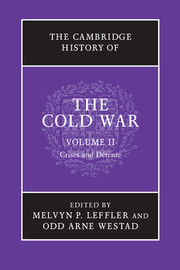Book contents
- Frontmatter
- 1 Grand strategies in the Cold War
- 2 Identity and the Cold War
- 3 Economic aspects of the Cold War, 1962–1975
- 4 The Cuban missile crisis
- 5 Nuclear competition in an era of stalemate, 1963–1975
- 6 US foreign policy from Kennedy to Johnson
- 7 Soviet foreign policy, 1962–1975
- 8 France, “Gaullism,” and the Cold War
- 9 European integration and the Cold War
- 10 Détente in Europe, 1962–1975
- 11 Eastern Europe: Stalinism to Solidarity
- 12 The Cold War and the transformation of the Mediterranean, 1960–1975
- 13 The Cold War in the Third World, 1963–1975
- 14 The Indochina wars and the Cold War, 1945–1975
- 15 The Cold War in the Middle East: Suez crisis to Camp David Accords
- 16 Cuba and the Cold War, 1959–1980
- 17 The Sino-Soviet split
- 18 Détente in the Nixon–Ford years, 1969–1976
- 19 Nuclear proliferation and non-proliferation during the Cold War
- 20 Intelligence in the Cold War
- 21 Reading, viewing, and tuning in to the Cold War
- 22 Counter-cultures: the rebellions against the Cold War order, 1965–1975
- 23 The structure of great power politics, 1963–1975
- 24 The Cold War and the social and economic history of the twentieth century
- Bibliographical essay
- Index
- References
13 - The Cold War in the Third World, 1963–1975
Published online by Cambridge University Press: 28 September 2010
- Frontmatter
- 1 Grand strategies in the Cold War
- 2 Identity and the Cold War
- 3 Economic aspects of the Cold War, 1962–1975
- 4 The Cuban missile crisis
- 5 Nuclear competition in an era of stalemate, 1963–1975
- 6 US foreign policy from Kennedy to Johnson
- 7 Soviet foreign policy, 1962–1975
- 8 France, “Gaullism,” and the Cold War
- 9 European integration and the Cold War
- 10 Détente in Europe, 1962–1975
- 11 Eastern Europe: Stalinism to Solidarity
- 12 The Cold War and the transformation of the Mediterranean, 1960–1975
- 13 The Cold War in the Third World, 1963–1975
- 14 The Indochina wars and the Cold War, 1945–1975
- 15 The Cold War in the Middle East: Suez crisis to Camp David Accords
- 16 Cuba and the Cold War, 1959–1980
- 17 The Sino-Soviet split
- 18 Détente in the Nixon–Ford years, 1969–1976
- 19 Nuclear proliferation and non-proliferation during the Cold War
- 20 Intelligence in the Cold War
- 21 Reading, viewing, and tuning in to the Cold War
- 22 Counter-cultures: the rebellions against the Cold War order, 1965–1975
- 23 The structure of great power politics, 1963–1975
- 24 The Cold War and the social and economic history of the twentieth century
- Bibliographical essay
- Index
- References
Summary
In 1958, only one year after his country gained independence from Britain, the Ghanaian prime minister, Kwame Nkrumah, delivered a speech before the Council on Foreign Relations in New York. In addition to a resolute anti-imperialism, he emphasized that two related imperatives would play a crucial role in shaping the orientation of Africa toward the wider world. First, the tremendous “industrial and military power concentrated behind the two great powers in the Cold War” demanded that the new states of Africa pursue a policy of non-alignment. In Africa, Nkrumah insisted, “the opportunities of health and education and a wider vision which other nations take for granted are barely within reach of our people.” To preserve their impoverished continent from devastating violence, African nations would have to remain apart from the Cold War’s military alliances, rivalries, and strife. Second, Africa would have to seek dramatically accelerated development. Colonial overlords had failed to deliver promised advances, but “now comes our response. We cannot tell our peoples that material benefits and growth and modern progress are not for them. If we do, they will throw us out and seek other leaders who promise more. And they will abandon us, too, if we do not in reasonable measure respond to their hopes. We have modernize.”
- Type
- Chapter
- Information
- The Cambridge History of the Cold War , pp. 258 - 280Publisher: Cambridge University PressPrint publication year: 2010
References
- 15
- Cited by

